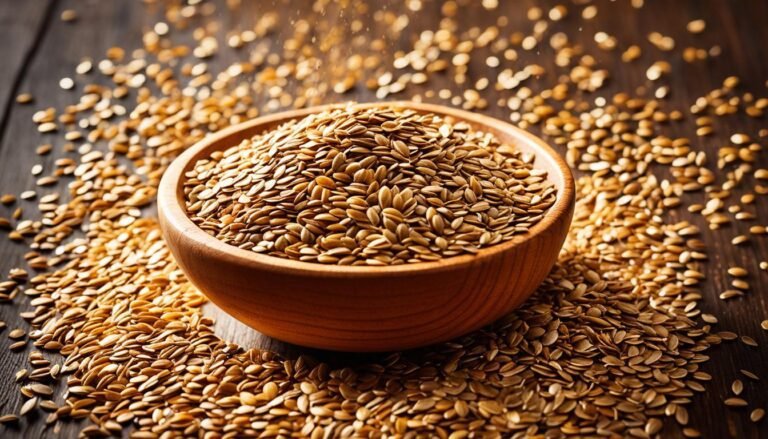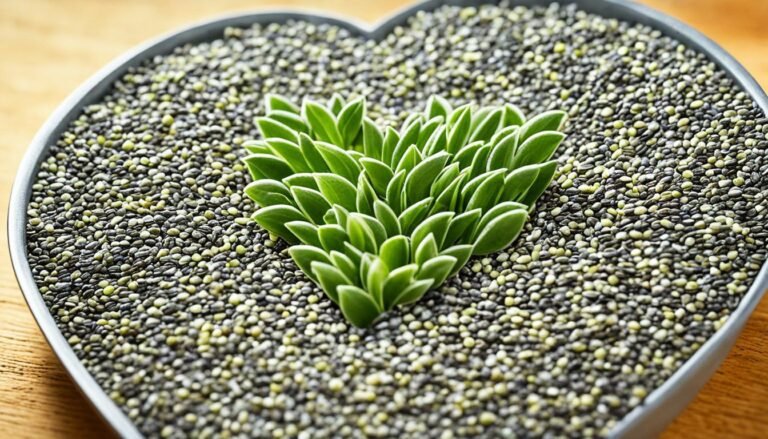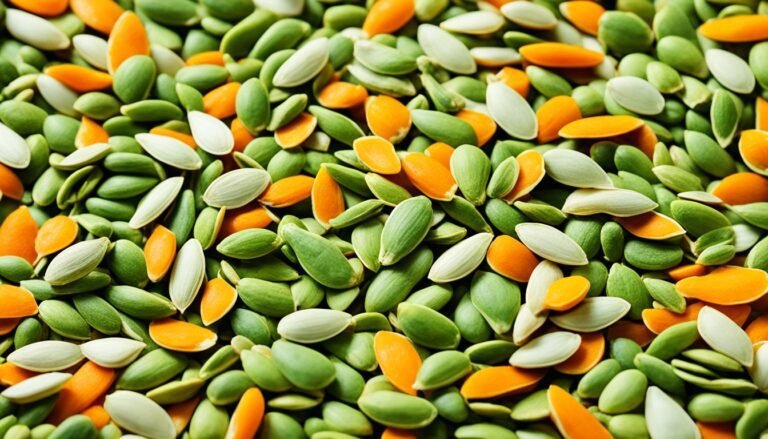Poppy Seeds: Tiny Powerhouses of Flavor and Nutrition

Just an ounce of poppy seeds gives you five grams of protein. These tiny seeds are great for baking. They are packed with nutrients and should be in every pantry. You can find them in lemon poppy seed muffins and tasty dressings. People love them all over the world.
Poppy seeds have been popular for cooking and healing for thousands of years. Now, they are beloved in the United States. People use them in cakes and salad dressings.
Aside from being tasty, poppy seeds are loaded with good nutrients. They have six grams of fiber and 30% of the Daily Value for calcium. This makes them great for your overall health. You can put them on yogurt or in your baked treats. Poppy seeds are a smart choice for any meal.
Origins and Cultivation of Poppy Seeds
Tracing the Ancient Origins of Poppy Seeds
Poppy seeds have a rich history, going back over thousands of years. They were first used around 2700 BC in the Mediterranean. These seeds were loved for their gentle calming effects and taste.
Today, they are used worldwide in cooking. Yet, their growth mainly happens in 15 countries. Turkey, Czechia, and Spain lead in poppy seed production.
The Journey from Seed to Seed: Harvesting Poppy Seeds
Poppy seeds come from the flowers of the poppy plant. Each plant has many flowers. Inside the flower is a seed pod.
The main pod, called the “hen,” is surrounded by “chicks.” When the petals drop, the pods dry for days. Then, they’re opened to get the tiny, bluish-black seeds.
A field can grow 2,500 seeds in just one square foot. If the pods aren’t collected, they spread their seeds. This lets new poppy plants come up the next year.
In 2018, the world made 76,240 tonnes of poppy seeds. Turkey made 35% of this. The Czech Republic and Spain were also big in production. Poppy seeds have long been important to people. They still are, leading to a big farming job around the globe.
Culinary Uses of Poppy Seeds
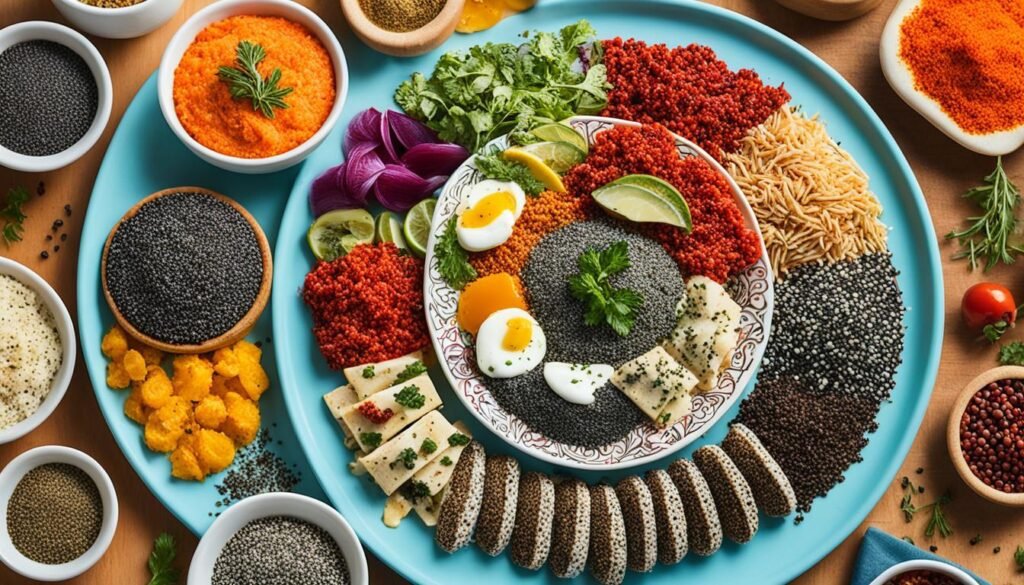
Poppy seeds can make sweet and savory dishes from all over taste better. They’re in the sweets of Europe and the spices of India. These seeds bring a little nutty taste and a nice crunch to tons of foods.
Versatile Ingredient in Global Cuisines
There are many ways to use poppy seeds in cooking. You can use them whole, ground, or make them into oil. In Europe, they love putting poppy seeds in pastries and breads. Jewish dishes also use a lot of poppy seeds in their recipes.
In India, they use white poppy seeds in sauces and thick stews. The U.S. loves poppy seeds with lemon in muffins and scones. They also spice up salads and top bagels beautifully.
Poppy seeds are even great in simple pasta dishes. Their nutty taste mixes well with garlic, lemon, and herbs.
| Culinary Use | Cuisine | Flavor Profile |
|---|---|---|
| Pastries, Breads, Fillings | European, Jewish | Nutty, Delicate |
| Sauces, Stews | Indian | Earthy, Thickening |
| Muffins, Scones, Salad Dressings, Bagel Toppings | American | Citrusy, Savory |
| Pasta Dishes | Global | Nutty, Herbal |
No matter how you use them, poppy seeds add something special. They’re loved by everyone from chefs to home cooks for a reason.
Nutritional Powerhouse: The Benefits of Poppy Seeds
Poppy seeds are small but mighty. They are loaded with essential vitamins, minerals, and healthy fats. This makes them a top superfood choice. Poppy seeds help improve bone health and aid digestion. Their nutritional value is truly remarkable.
These seeds come packed with fiber, omega-6 fatty acids, and many important minerals. Adding them to tea might even help reduce anxiety and improve sleep. We enjoy using poppy seeds in our Lemon Poppy Seed Dressing. They add a great texture and a hint of nutty taste.
The benefits of poppy seeds go beyond good taste. Here are some of the main reasons they are good for you:
- They’re high in fiber, which keeps your digestive system healthy and helps you stay regular.
- The omega-6 fatty acids are critical for a strong heart and overall cardiovascular health.
- They’re an excellent calcium source, important for strong bones and preventing osteoporosis.
- The seeds also have magnesium, which lowers stress hormones and improves sleep.
- The iron in poppy seeds boosts blood health, brain function, and decreases dementia risk.
- Antioxidants in poppy seeds protect your skin and hair, making you look healthy and vibrant.
Adding poppy seeds to your meals is both easy and enjoyable. You can sprinkle them on salads, or bake them into your favorite treats. Or, turn them into a calming tea. Poppy seeds are a small but powerful addition to your diet.
Poppy Seeds: A Versatile Ingredient
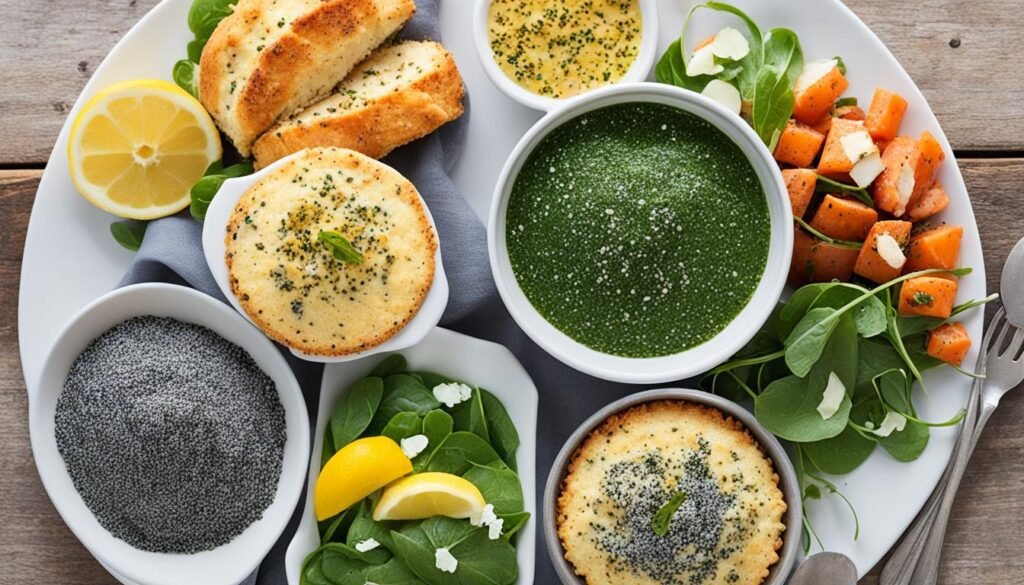
From Sweet to Savory: Culinary Versatility
Poppy seeds are truly unique. They fit in everywhere, from European breads to Indian dishes. They bring a special taste and texture nobody can resist.
In European baking, you see black poppy seeds a lot. They go on top of breads, adding crunch and a nutty taste. Think of a poppy seed strudel, a sweet pastry. Its filling uses ground poppy seeds for flavor.
On the flip side, Indian cooking uses white poppy seeds differently. They’re ground into a smooth paste that goes into curries and gravies. This adds a creaminess and a subtle flavor. It shows how versatile poppy seeds can be across different cooking styles.
The versatility of poppy seeds is incredible for any cook. Their use ranges from adding crunch to breads to enhancing the creaminess of curries. This ingredient truly opens doors to new and exciting dishes.
Nutritional Value of Poppy Seeds
Packed with Essential Nutrients
Poppy seeds aren’t just tasty, they are rich in many essential nutrients. These seeds are loaded with nutrients that are great for your health. They do more than add flavor to your food.
A tablespoon of poppy seeds gives you a lot of important minerals like calcium, phosphorus, and magnesium. It offers more than 25% of what you need daily. This makes them great for anyone wanting to increase mineral intake.
Poppy seeds also provide iron and zinc. These are key for keeping your blood and immune system strong.
| Nutrient | Amount per 100g | % Daily Value |
|---|---|---|
| Energy | 536 calories | – |
| Protein | 21.43 g | – |
| Total Fat | 39.29 g | – |
| Carbohydrate | 28.57 g | – |
| Fiber | 25 g | 100% |
| Calcium | 1,250 mg | 125% |
| Iron | 9.64 mg | 54% |
| Magnesium | 357 mg | 89% |
| Zinc | 8.04 mg | 73% |
Adding poppy seeds to your meals is an easy way to boost your nutrient intake. This can help improve your overall health.
Health Benefits of Poppy Seeds
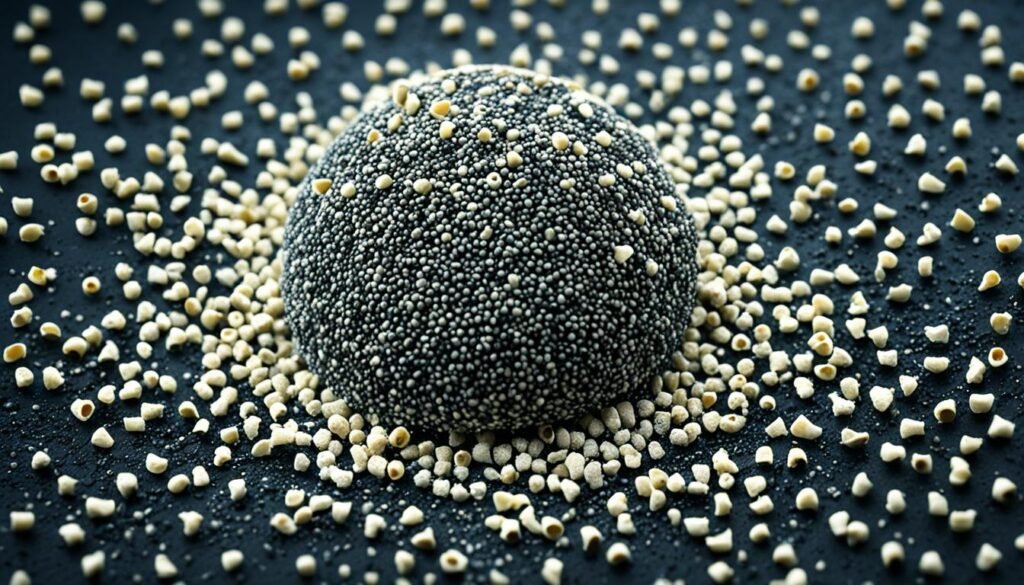
Poppy seeds bring more than just flavor to the table. They offer many health benefits too. They support our guts and help keep our bones strong. This makes them a great addition to any diet.
Supporting Digestive Health
Poppy seeds are great for our stomachs. They are full of fiber, which aids in digestion and helps prevent constipation. This fiber also supports a healthy mix of gut bacteria, which is key for wellbeing.
Adding poppy seeds to our meals is an easy way to help our digestive system.
Promoting Bone Strength
Poppy seeds do wonders for our bones, thanks to their calcium. Calcium, magnesium, and phosphorus all work together for strong bones. This is important for fighting bone diseases like osteoporosis later in life.
Eating poppy seeds regularly ensures our bones get the nutrients they need.
Besides their digestive and bone benefits, poppy seeds are packed with protein, fiber, and many vitamins. Adding them to our meals helps us live a balanced and healthy life.
Culinary Adventures with Poppy Seeds
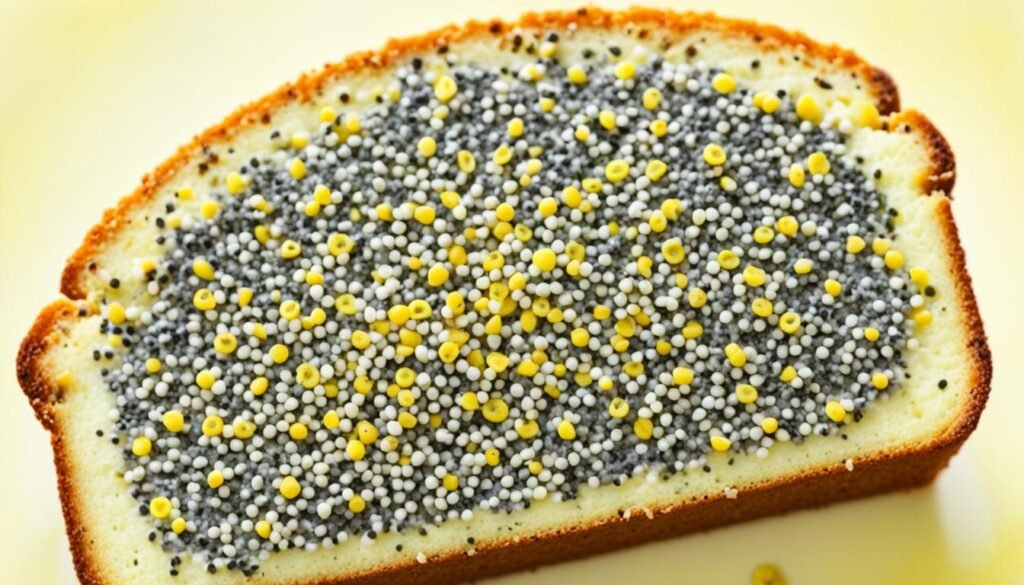
Poppy seeds are not just for old recipes anymore. These small, tasty seeds can add a creative twist to many new dishes. They bring unique textures and flavors to your food journey. Try them on salads for a crunchy kick or mix them in smoothies for an extra health boost. There are so many ways to enjoy poppy seeds in your meals.
Using poppy seeds as a meat or fish crust is a fun idea. They add a nice crunch to the soft protein, making it look and taste great. Make your own crust by combining the seeds with breadcrumbs, herbs, and some butter. Press this mix onto your meat or fish before cooking it.
Poppy seeds are great for baking too. Besides the usual muffins or rolls, you can add them to bread, scones, or cookies. This gives your baked goods a hint of crunch and a nutty flavor. You can also mix ground poppy seeds into the dough for more flavor.
Try putting poppy seeds in salad dressings for something new. They go well with vinegars, mustard, and herbs. This mix adds a fun texture and taste to your salads or roasted veggies.
The options with poppy seeds are endless. Try them in all kinds of recipes, from sweet to savory. They’ll take your dishes to a whole new level of taste and look, surprising and delighting anyone who tries them.
Poppy Seeds in World Cuisines
European Baking Traditions
Poppy seeds are loved in European baking. They’re a key part of traditional pastries and breads. You can find them in the crunchy topping of loaves or the sweet filling of desserts.
In places like Austria and Hungary, poppy seed pastries shine during the holidays. The combo of ground poppy seeds and flaky dough is a hit. Pastries like the Austrian Mohnstriezel and Hungarian Mákos bejgli are must-haves at celebrations.
They’re not just for sweets. In Poland, they’re part of a savory Christmas dessert. In the Czech Republic and Slovakia, poppy seed dumplings are a popular and comforting dish.
Indian Culinary Heritage
White poppy seeds are key in many Indian foods. They’re mainly used in the cuisine of the north.
Poppy seeds are often ground and added to curries for flavor. They add a nutty taste that works well with Indian spices. For example, in Goa’s Xacuti, poppy seeds help create a rich, flavorful dish.
They’re not just for main courses. In sweets, their creamy and nutty qualities stand out. Indian desserts like rice puddings and halwas get a unique touch from poppy seeds.
Poppy seeds enrich the world’s food in many ways. They add character to pastries and meals alike. These ancient seeds are still a favorite today, bringing joy to food lovers everywhere.
Selecting and Storing Poppy Seeds
To keep poppy seeds tasty and healthy, pick and keep them right. Choose fresh-looking ones without moisture or mold when you buy poppy seeds. Keep them in a cool, dry spot in a sealed container. This saves their oils and stops them from getting bad.
Whole poppy seeds stay good for up to six months if you store them correctly. But, once you grind them, they lose their strength quicker. If you won’t use them soon, keep them in the fridge or freezer. This will also help if you’ve a lot of them.
Use these tips to buy and store poppy seeds. This way, they keep their great taste and health benefits longer. Poppy seeds will then be a perfect addition to your cooking.
FAQ
What are poppy seeds and where do they come from?
Poppy seeds are tiny, bluish-black seeds from the poppy flower, Papaver somniferum. They have a long history in medicine and cooking.
How are poppy seeds cultivated and harvested?
Poppy plants have many flowers with large pods. These pods dry after losing their petals. Inside are the valuable poppy seeds, up to 2,500 in a square foot field.
What are the most common culinary uses of poppy seeds?
They flavor baked items, dressings, and top bread. Poppy seeds shine in European, Middle Eastern, Jewish, and Indian foods.
What are the health benefits of poppy seeds?
These seeds are packed with fiber, essential fats, calcium, and magnesium. They boost digestion, bone health, and general wellness.
How can poppy seeds be used in modern, creative ways?
They’re great in salads, smoothies, and as a meat or fish crust. This adds a great nutty taste and crunchy texture.
How should poppy seeds be stored to maintain their quality?
Store poppy seeds in a cool, dry spot, in an airtight container. This keeps their oils fresh and stops them from spoiling. They stay good for about six months like this.

